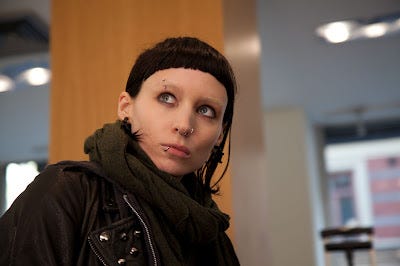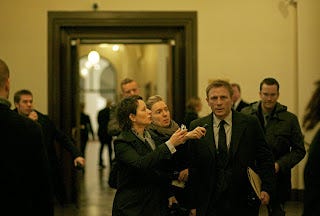Review: "The Girl With the Dragon Tattoo" is a disappointingly dry, mechanical adaptation

Film Rating: B–
My “Intro To Film” professor had a mantra about adapting books into movies: “The filmmaker’s only obligation is to stay true to the spirit of the original work.” The implication, of course, is that cinema is a vastly different medium from literature, and if one doesn’t make the necessary changes, the result won’t feel truly cinematic, but clunky, dull, and uninvolving. Examples of this theory can be found everywhere – the first two “Harry Potter” films stay religiously close to the novels, and are bloated and poorly paced as a result. The “Potter” films became great when they began doing their own thing with the material, finding bold new cinematic ways to express the magic of Rowling’s work. The “Lord of the Rings” trilogy often strays very far from the J.R.R. Tolkien novel, but if it didn’t, the films wouldn’t have a chance at matching the emotional impact of the book; emotions are conveyed quite differently on screen than they are on page.
David Fincher’s take on “The Girl With the Dragon Tattoo” is an extremely well made film, full of strong performances, lush visuals, and a terrific musical score. But it is such a dry, mechanical, and at times lazy adaptation of the original Steig Larsson novel that it fails to engage for a large portion of its run-time. Screenwriter Steven Zaillian – who typically displays far more talent and creativity than he does here – seemingly felt compelled to include as much of the novel as possible, and has thus fashioned an adaptation that plays not like a movie, but like the novel put on fast-forward, going through all the motions like a well-oiled machine without room for any of the introspection, character analysis, or depth of the original work. In trying to stay “true” to the book, the film captures only the skeleton of the story. It is technically accurate, but it misses out on the real meat of the story, all the things that made the book such a great read. Those unfamiliar with Larsson’s work will no doubt enjoy it a little bit more, but even then, events go by so fast and characters are so vastly underwritten that I can’t see newcomers feeling welcomed. Continue Reading after the jump...

As in the book (and 2009 Swedish film, which I haven’t seen), “The Girl With the Dragon Tattoo” follows two main characters: Mikael Blomkvist (Daniel Craig) and Lisbeth Salander (Rooney Mara). Mikael is an investigative journalist, and has just lost his entire life savings in a libel lawsuit after publishing an accidentally inaccurate, inflammatory story about a billionaire industrialist. With no other options, he accepts an offer from another wealthy businessman, Henrik Vanger (Christopher Plummer), to come to Vanger’s estate in the wintry Hedestad, ostensibly to write Vanger’s memoirs. But what Vanger really wants is for Mikael to investigate a murder, the murder of Vanger’s neice Harriet, who Vanger believes was killed by a member of his extended family thirty-six years earlier. As the investigation heats up, Mikael requires a research assistant, and is pointed towards Lisbeth, a 23-year-old genius with impeccable computer hacking skills and severe social deficiencies.
As I said before, the film is slavishly accurate to the book; nearly every scene in the novel is accounted for, with only minor trims here and there. But the novel is six hundred pages long, so racing through all that material – so much of it dense and wordy, given the nature of the mystery – requires dramatizing only the bare minimum of each scene, getting nothing but the essentials across. It goes without saying that the resulting pacing is extremely awkward, but this methodically utilitarian approach also leaves everything of real importance by the wayside: i.e., character history and development, relationships, finer narrative subtleties, and for most of the film, any sense of true tension or intrigue, leaving us only with the core mystery which, while good, isn’t enough to carry a film. It wasn’t what made the book great either. I loved the novel for its characters; the charismatic, determined and brilliant Mikael and the mesmerizing Lisbeth, just as compelling as the pop-culture hype she’s created suggests. Lisbeth’s tortured past and the Harriet investigation provided a compelling meditation on violence against women and the lifelong mental scars abuse leaves, while the relationship Mikael and Lisbeth forge gave a very nice message about how large an effect simple kindness and respect can have on abuse victims.

The film’s adaptation captures very little of that, focusing so strongly on fitting in every last plot detail that all those finer subtleties fall by the wayside. That’s what I cared about in the book, and since Fincher and Zaillian found no creative way of translating that to the screen, I found myself losing interest fast. Even with the investigation, which is captured in full, I felt entirely disengaged, because the film has nothing new to offer me. Watching mechanical, automated dramatization of scenes I’ve already read isn’t my idea of a good time. I want a fresh take on the material when I see a movie, something that shakes my own perspective, and in that regard, “The Girl With the Dragon Tattoo” never justifies its own existence.

Rooney Mara and Daniel Craig attempt to make up for their severely underwritten parts, and Mara is more successful in this regard. She has a clear interpretation of the character, playing Lisbeth as a damaged little girl, someone who has lived through so many horrors that she uses her tattoos, piercings, clothing, and standoffish nature as a shield, a front to hide her own vulnerabilities. As the film moves along and she gets to know Mikael, that shield begins slipping away, and we see that, underneath, she isn’t really the asocial punk she tries so hard to be. It’s a great performance, especially considering that Mara conveys most of that without any favors from the script. Craig has a harder time; he too is good, but Mikael simply isn’t as expressive a character as Lisbeth, and since we are told next to nothing about who Mikael is, Craig’s performance comes across as a smarter James Bond, rather than a fully-formed, independent character. It also bugged me from start to finish that Mara uses a Swedish accent while Craig keeps his British one. Why anyone thought that was a good idea boggles my mind.
On a technical level, the film is undoubtedly a triumph, but that’s to be expected of a Fincher production. Jeff Cronenwth’s cinematography is very strong and effectively atmospheric, and I’ve already waxed poetic about Trent Reznor and Atticus Ross’ score in a separate review (although it should be noted the score is far more impressive on its own than in context, where it is used relatively sparsely). I don’t like how the film is edited in the first half – Fincher cuts far too rapidly between Mikael and Lisbeth’s separate arcs, interrupting the development of each scene – but once Lisbeth and Mikael join forces, that problem disappears.

In fact, the biggest flaw with the mechanical adaptation is that it so often constrains Fincher’s artistry. Fincher is a fantastic director who has always had a clear, powerful vision for his material, and in the sequences where the adaptation is lenient enough to allow him to go to town, “The Girl With the Dragon Tattoo” absolutely soars. There’s a twenty-minute stretch in the third act, as Mikael and Lisbeth discover and pursue killer from separate locations, that is absolutely brilliant. It’s more or less true to the book, but Fincher conveys the concepts from that section visually, using editing and sound – or the lack thereof – to build tension in a way that is uniquely cinematic. I knew what was coming and I was still on the edge of my seat. Fincher even goes completely off-book for the climactic confrontation, and it’s entirely riveting, thanks to a wonderfully eerie speech from the killer and the zaniest use of an Enya song I’ve ever heard. This stretch suggests a much better film could have been possible if the book was used as a springboard, rather than a bible; other spots – usually revolving around Lisbeth, but occasionally involving Mikael’s picture-based research – show equal amounts of promise, and that’s what’s most frustrating about the finished project. If it were all rote and mechanical, I could dismiss it as a failure and be done with it, but Fincher is allowed to step up and impress often enough to remind us that this movie had real, honest-to-God masterpiece potential.
“The Girl With the Dragon Tattoo” isn’t a bad movie. Far from it. It’s a competent adaptation that is sure to please some viewers, particularly those new to the material, but given the strength of the novel and David Fincher’s considerable directorial talents, the end product shouldn’t be merely competent. It should be great, and I hope this serves as a lesson to audiences and filmmakers alike that a strict, literal adaptation does not equal a compelling one. I’d say the film is worth seeing for Mara’s performance and the intermittent moments of brilliance, but I wouldn’t make it a priority. The soundtrack is a far more satisfying experience, to be honest, and that’s a criticism I never thought I would make about a film.

